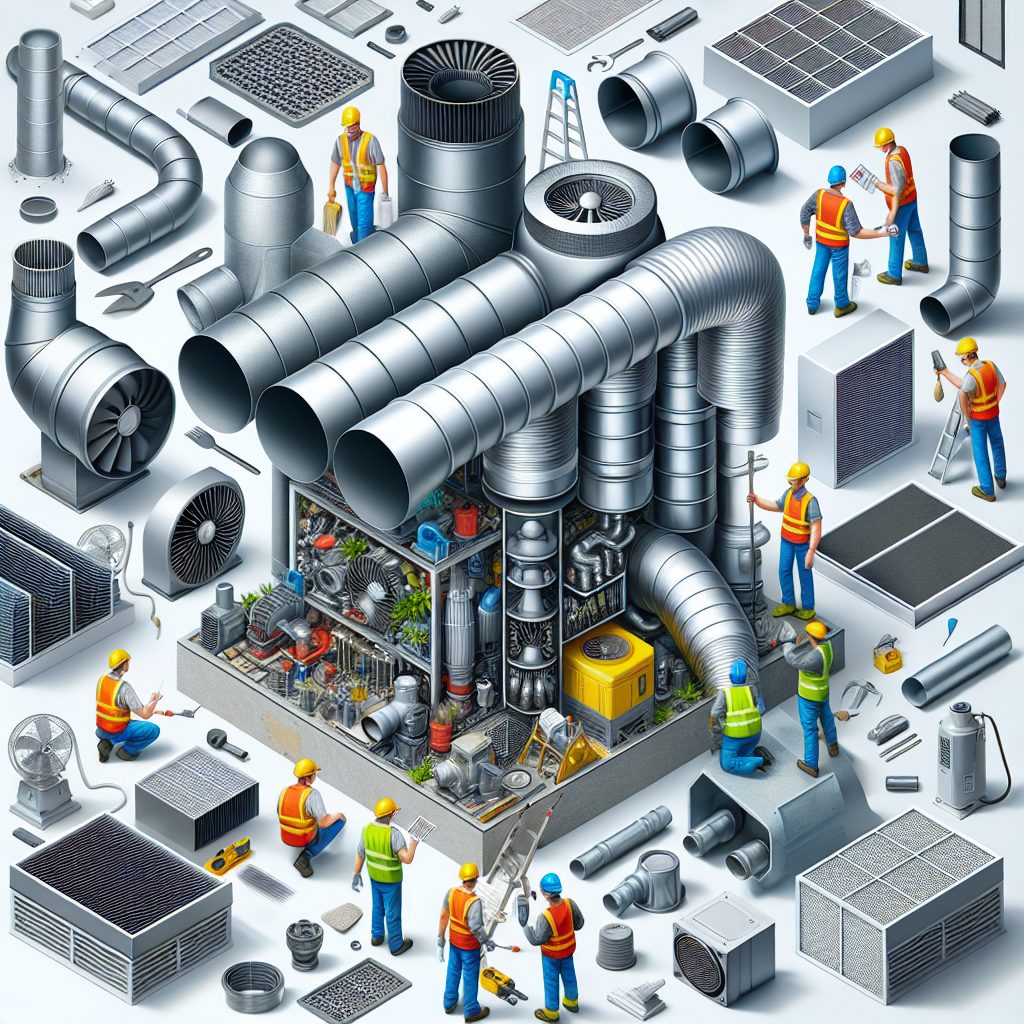
Ventilation system upgrades are crucial for maintaining a healthy and comfortable indoor environment. In simple terms, ventilation refers to the process of bringing fresh air into a space and removing stale air. A well-functioning ventilation system helps regulate temperature, control moisture levels, and reduce the concentration of pollutants and odors. However, many older buildings have outdated ventilation systems that are inefficient or inadequate. These systems may not meet the current demands for air quality and can lead to various issues such as poor airflow, excessive energy consumption, and increased risk of respiratory problems.
When it comes to ventilation system upgrades, there are several key impacts and unique features to consider. Firstly, upgrading your ventilation system can significantly improve indoor air quality. This is especially important in today’s world, as poor air quality has been linked to various health issues, including allergies, asthma, and other respiratory problems. Additionally, a well-designed and properly functioning ventilation system can help regulate humidity levels, preventing mold growth and maintaining a comfortable living or working environment.
Now that we’ve explored the importance and impacts of ventilation system upgrades, let’s delve into the key takeaways from this article. We will discuss the different types of ventilation systems available, the benefits of upgrading to more efficient systems, and steps to consider when planning a ventilation system upgrade. So, keep reading to discover how you can create a healthier and more comfortable space through ventilation system upgrades.
Key Takeaways
1. Ventilation system upgrades are crucial for improving indoor air quality and preventing the spread of infectious diseases, such as COVID-19.
2. Upgrading ventilation systems can include improvements such as increasing the amount of outdoor air being brought in, improving air filtration, and implementing air disinfection technologies.
3. These upgrades can help remove airborne contaminants, reduce the risk of transmission, and create a healthier and safer indoor environment for occupants.
4. It is important for building owners and managers to work with HVAC professionals to assess their current systems, identify potential upgrades, and determine the most effective strategies for their specific needs.
5. While upgrading ventilation systems can require a financial investment, the long-term benefits, including improved occupant health and productivity, make it a worthwhile endeavor.
What are the Benefits of Ventilation System Upgrades?
1. Improved Indoor Air Quality
By upgrading your ventilation system, you can significantly enhance the indoor air quality of your space. A well-functioning ventilation system effectively removes pollutants, allergens, and excess humidity from the air, promoting a healthier and more comfortable environment. With proper filtration and ventilation, you can reduce the presence of airborne contaminants, such as dust, pet dander, mold spores, and volatile organic compounds (VOCs), which can lead to respiratory issues and allergies.
2. Energy Efficiency
Ventilation system upgrades can also contribute to improved energy efficiency in your home or building. Older ventilation systems may be outdated and consume more energy than necessary. By upgrading to a modern system, you can benefit from advanced technology and energy-saving features, such as variable speed motors and demand-controlled ventilation. These upgrades not only reduce energy consumption but also decrease utility costs, making it a cost-effective investment in the long run.
3. Enhanced Comfort
A well-designed ventilation system upgrade can greatly enhance the overall comfort of your indoor environment. It helps regulate temperature and humidity levels, preventing the space from feeling stuffy or excessively dry. Adequate ventilation also promotes proper air circulation, ensuring even distribution of heated or cooled air throughout the room. This helps maintain a consistent and comfortable temperature, eliminating hot or cold spots.
4. Odor Control
Ventilation system upgrades are effective in controlling unpleasant odors within your space. Cooking smells, pet odors, and other unwanted odors can be efficiently removed with the help of a well-functioning ventilation system. Upgrades such as activated carbon filters can effectively trap and eliminate odorous particles from the air, resulting in a fresh and odor-free indoor environment.
5. Compliance with Building Codes and Standards
In many jurisdictions, ventilation system upgrades are necessary to comply with building codes and standards. These regulations are in place to ensure that indoor environments meet certain health and safety requirements. By upgrading your ventilation system, you can ensure that your space meets these standards, providing a healthy and safe environment for occupants.
6. Noise Reduction
Upgrading your ventilation system can help reduce unwanted noise within your space. Older systems may produce loud and disruptive noises, causing discomfort to occupants. By investing in a modern and quieter ventilation system, you can create a peaceful and quiet indoor environment, enhancing the overall experience for everyone.
Top Tips for Ventilation System Upgrades
1. Assess your current ventilation system: Before proceeding with any upgrades, evaluate the current condition and performance of your ventilation system. Determine its strengths, weaknesses, and areas that require improvement.
2. Consult with a professional: Seek guidance from a qualified HVAC technician or engineer who specializes in ventilation systems. They can assess your specific needs, recommend the most suitable upgrades, and ensure proper installation and maintenance.
3. Consider energy-efficient options: Look for ventilation system upgrades that prioritize energy efficiency. This includes features such as variable speed motors, heat recovery ventilators, and smart controls that optimize airflow and minimize energy wastage.
4. Evaluate filtration capabilities: Pay attention to the filtration capabilities of your ventilation system. Consider upgrading to air filters with higher MERV ratings to effectively capture a wider range of pollutants and allergens.
5. Regular maintenance: Once you have upgraded your ventilation system, establish a routine maintenance schedule to ensure optimal performance and longevity. This includes regular filter replacement, cleaning ducts, and inspecting fans and motors.
6. Monitor indoor air quality: Invest in monitors or sensors that measure and track indoor air quality parameters. This allows you to assess the effectiveness of your ventilation system and make any necessary adjustments or improvements.
7. Stay informed on regulations: Stay up-to-date with local building codes and regulations regarding ventilation systems. Ensure that your upgrades comply with these standards to avoid any legal or safety issues.
Remember, proper ventilation is essential for maintaining a healthy and comfortable indoor environment. By investing in ventilation system upgrades, you can enjoy improved air quality, energy efficiency, and overall occupant satisfaction.
FAQ:
1. How can ventilation system upgrades improve indoor air quality?
By upgrading your ventilation system, you can ensure better air circulation, which helps remove pollutants and allergens from the indoor environment. This reduces the risk of respiratory issues and promotes a healthier living or working space.
2. What are the benefits of upgrading to an energy-efficient ventilation system?
An energy-efficient ventilation system can help reduce energy consumption and costs. It optimizes the airflow while minimizing energy wastage, thus enhancing overall energy efficiency and sustainability for your property.
3. Do ventilation system upgrades help control humidity levels?
Absolutely! Modern ventilation systems can be equipped with humidity control features. Upgrading your system allows you to maintain optimal humidity levels, preventing mold growth, musty odors, and condensation-related problems.
4. Can a ventilation system upgrade reduce the occurrence of condensation on windows?
Upgrading your ventilation system can significantly minimize condensation on windows. It helps eliminate excess moisture in the air, reducing the chances of condensation formation and subsequent damage to the windows and surrounding areas.
5. Are ventilation system upgrades expensive?
While the cost of ventilation system upgrades may vary depending on factors such as the size of the property and specific requirements, they generally represent a valuable long-term investment that can contribute to energy savings and improved indoor air quality.
6. How often should ventilation system upgrades be performed?
It is recommended to have your ventilation system inspected regularly by professionals to assess its condition and determine if any upgrades are necessary. However, typically, ventilation system upgrades may be required every 10-15 years, depending on the specific system and its usage.
7. Will a ventilation system upgrade reduce heating or cooling efficiency?
No, a properly planned and executed ventilation system upgrade should not negatively impact your heating or cooling efficiency. In fact, it can enhance the overall performance of your HVAC system by ensuring better air distribution throughout the space.
8. Can I install a ventilation system upgrade myself?
It is highly recommended to hire a professional HVAC technician for ventilation system upgrades. They possess the necessary expertise, experience, and equipment to correctly assess your system’s needs, perform the required upgrades, and ensure proper installation for optimal functionality.
9. Do ventilation system upgrades reduce noise levels?
Yes, ventilation system upgrades can help minimize noise levels generated by the system. Newer models often feature noise reduction technologies, enabling a quieter operation and a more peaceful indoor environment.
10. Can a ventilation system upgrade enhance overall property value?
Indeed, upgrading your ventilation system can contribute to increasing the value of your property. Potential buyers or tenants are more likely to be attracted to a property with modern, energy-efficient ventilation systems that offer improved comfort and healthy living conditions.
Final Thoughts:
Ensuring a well-functioning ventilation system is crucial for maintaining a healthy and comfortable indoor environment. Ventilation system upgrades not only improve air quality and reduce pollutants but also promote energy savings and overall sustainability.
By investing in a ventilation system upgrade, you not only enhance the value and appeal of your property but also prioritize the well-being and satisfaction of its occupants. Take the initiative today and consult with HVAC professionals to explore the best upgrade options tailored to your specific needs and enjoy the benefits for years to come.



